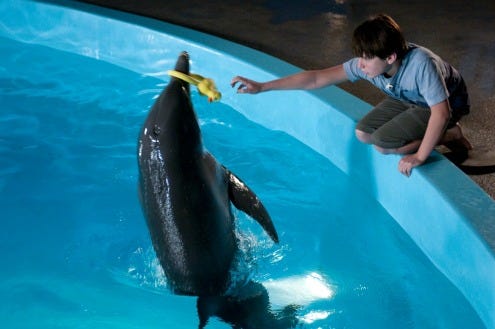Dolphin Tale

A syrupy-sweet, boy-meets-aquatic-mammal flick, "Dolphin Tale" is blatantly manipulative, saccharine as a mouthful of Sweet 'n Low, and, yes, is still a bit of playful, innocent fun.
"Tale" is inspired by the true story of Winter, a dolphin who, caught in crab fishermen's ropes, washed ashore on a beach in Florida for all intents and purposes crippled. The ropes she was tangled in cut off the circulation to her tail, forcing the marine-rescue people who took her in to amputate her tail.
Winter plays herself in the film, which constitutes the extent of the reality-based portion of the film. The fictional part revolves around a young boy named Sawyer, played with spark and gusto by Nathan Gamble, who befriends Winter, "Free Willy" style.
Director Charles Martin Smith crafts a story of inspiration amid disability that makes Winter something of a hero to the disabled, unashamedly using war heroes and children to elicit tears. But he does so effectively and not crassly.
The film balances on the central relationship between Sawyer and Winter, and their relationship is indeed sweet and interesting. Sawyer is struggling in school and life, and the cousin he idolizes (Austin Stowell) is about to head overseas with the military. When he stumbles upon Winter one morning, he starts sneaking to the facility to visit her. He soon convinces his reluctant mom (Ashley Judd) to yank him out of summer school to let him do a little vocational training with Winter, and their relationship begins to cement.
They form an instant bond, along with Hazel (Cozi Zuehlsdorff), the daughter of the rescue facility head (Harry Connick Jr.). But the facility is in financial dire straits, and Winter's new method of swimming — swishing her hind end side to side rather than up and down — is putting stress on her spine. If things don't change, she'll have to be put down.
When Sawyer's cousin returns injured, Sawyer meets a prosthetics expert (Morgan Freeman) and gets a wacky idea.
The relationship, and the film, works in no small part thanks to Gamble's screen presence. He deftly handles the material and brings that sense of Winter reintroducing wide-eyed wonder to a boy at an age where, when they lose someone close to them, cynicism can begin sneaking in.
The film's stars are awkwardly placed; Judd bounces in and out of the picture for long stretches, Freeman doesn't even show up until almost halfway through, and Kris Kristofferson just kind of randomly shows up from time to time. You get the sense that they just wanted to be part of the movie, so they showed up for a few days of filming, hoping to lend their names to a film that otherwise wouldn't get the publicity.
"Dolphin Tale" was filmed in 3D, and while, as with most 3D films these days, much of the conversion is borderline pointless, there are a few snappy little 3D shots thrown in. Winter leaps out of the water here and there, and in one sequence, as they design Winter's prosthesis, we get blueprint schematics popping out at us onscreen (I was torn about this scene; it was on one hand nifty, but it quickly got tiresome toward the end).
Of course this is noble, but it makes for a somewhat awkward transition; when Freeman enters, he becomes a large part of the film, and other less-important characters step to the background.
"Dolphin Tale" is the sort of film where you know all of the beats; once the film begins, there are no real surprises. It's that triumph-of-the-human (or animal)-spirit tale that is part of why we love movies in the first place. If you have kids, they'll love it. You'll more than likely be reminded of similar films you watched as a kid and smile fondly, knowing this will be one your kids will think about one day when they take their kids to the movies.
